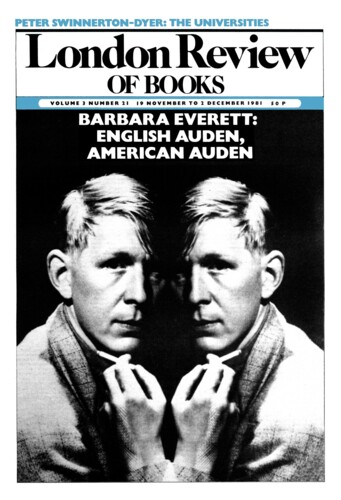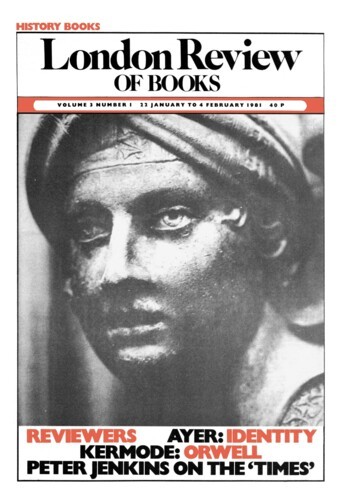John Thompson
John Thompson is Quain Student in English at University College, London.
Back to Byzantium
John Thompson, 22 January 1981
There’s a jet on the cover of Destinations, soaring silently above New York, bathed in the rosy, gauzy haze of a dawn sun. The serenity of it all is deceptive, because Jan Morris is screaming in on a special assignment from Rolling Stone. Her collection of essays touches down in a quick succession of trouble-torn areas – India in the Emergency, post-Watergate Washington, Southern Africa, Panama, even London with its National Front marches – then screams off again for a further twenty culturally-absorbent pages elsewhere. As Ms Morris says, Rolling Stone is an ‘urgent kind of magazine’, so all this rushing around is what we would expect. But she didn’t expect it, not at her time of life anyway: ‘I was a middle-aged Anglo-Welsh writer of romantic instinct and distinctly traditionalist prose, based on a small seaside village in North Wales.’ But in 1974, we learn, her stone was rolled away and she found herself resurrected by ‘the most thrilling phenomenon of contemporary American journalism’, an enterprise ‘which had established its fortunes upon the economics of rock music, and found its readers among the lively, restless, affluent and stereophonic avant-garde of young America’. She accepted the magazine’s commission ‘at once’: ‘I am fond of paradox.’
Orwell’s Reputation
22 January 1981
Pieces about John Thompson in the LRB
Plain English
Denis Donoghue, 20 December 1984
Orwell took little care of his manuscripts. He didn’t anticipate that collectors of such things would pay real money for them, and that universities would think it a privilege to turn a...
Read anywhere with the London Review of Books app, available now from the App Store for Apple devices, Google Play for Android devices and Amazon for your Kindle Fire.
Sign up to our newsletter
For highlights from the latest issue, our archive and the blog, as well as news, events and exclusive promotions.


